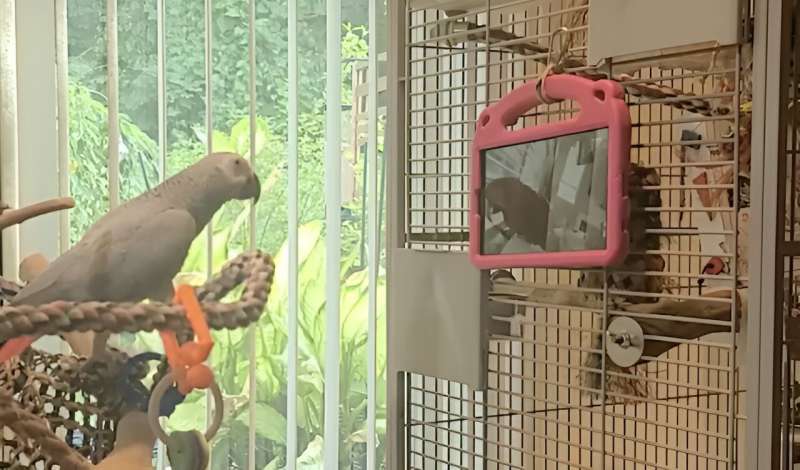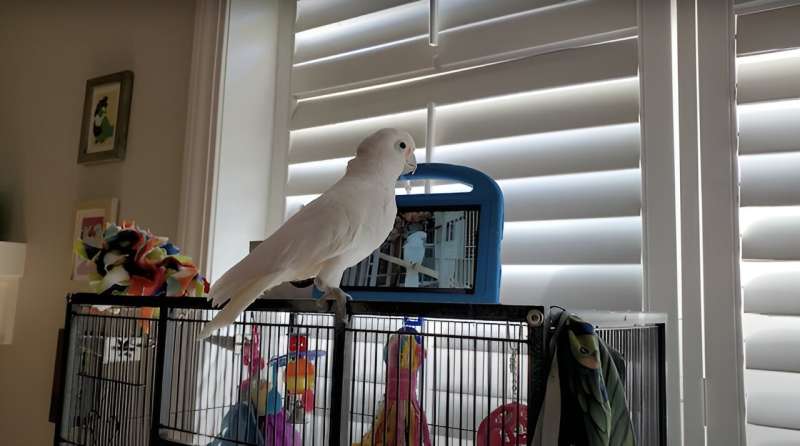This article has been reviewed according to Science X's editorial process and policies. Editors have highlighted the following attributes while ensuring the content's credibility:
fact-checked
trusted source
proofread
Pet parrots prefer live video-calls over watching pre-recorded videos of other birds

Pet parrots given the choice to video-call each other or watch pre-recorded videos of other birds will flock to the opportunity for live chats, new research shows.
The study, led by animal-computer interaction specialists at the University of Glasgow, gave tablet devices to nine parrots and their owners to explore the potential of the video chats to expand the birds' social lives.
Their results suggest that the clever birds, who often suffer from loneliness in captivity, may be able to tell the difference between live and pre-recorded content on digital devices, and strongly prefer interacting with other birds in real time.
The paper, titled "Call of the Wild Web: Parrot Engagement in Live vs. Pre-recorded Video Calls," will be presented at the Association of Computing Machinery's CHI conference on Human Factors in Computing Systems (CHI 2024) held in Honolulu May 11–16.
Over the course of the six-month study, the parrots chose to initiate calls to other birds significantly more often than they opted to watch pre-recorded footage.
They also seemed more engaged in the live chats, spending much longer on calls with other birds than they did watching videos from a library of options.
The findings could help steer the future course of the emerging "animal internet," which uses digital technology to empower animals to interact with humans and each other in new ways.
The research is the latest development in a collaboration between researchers at the University of Glasgow in the U.K. and Northeastern University in the U.S.
Previous research led by the University of Glasgow's Dr. Ilyena Hirskyj-Douglas explored the potential of video-calling to reduce loneliness in parrots and how parrots could benefit from playing games on digital tablets.
The outcomes of the research are set to be presented as a conference paper later this month.
Dr. Hirskyj-Douglas, from the University of Glasgow's School of Computing Science, is the paper's lead author. She said, "Our previous research had shown that parrots seem to benefit from the opportunity to video-call each other, which could help reduce the mental and physical toll that living in domestic situations can take on them.
"In the wild, they live in flocks and socialize with each other constantly. As pets, they're often kept on their own, which can cause them to develop negative behaviors like excessive pacing or feather-plucking.
"In this study, we wanted to see if we could identify differences in behavior when parrots were given agency over what they could see on their devices. Would they notice when the pre-recorded parrot on the screen didn't respond the same way a live one did? And if so, what could that tell us about designing future systems to fit their needs?"
To investigate how parrots would respond to the choice, the researchers provided their caregivers with tablet devices which displayed large bright buttons showing pictures of the other birds in the study. Then, the birds' caregivers trained them to initiate Facebook Messenger calls by ringing a bell when they wanted to interact with the screen.
After a "meet-and-greet" session where the birds were introduced to each other over video chat, the birds were each given open access to the system over 12 sessions totaling 36 hours. They could make a maximum of two calls in each session, for a maximum length of three hours.
Six of the sessions put the parrots in touch with another live bird on the other end of the call, while the other six connected them to pre-recorded video of their bird contacts. After each session, their caregivers recorded their birds' reactions to their interactions with the device.
Although overall engagement varied from parrot to parrot, the study showed that the birds seemed to prefer live calls to video sessions, spending an average of 266 seconds engaging with other birds compared to 166 seconds with pre-recorded videos. In total, the birds spent 561 minutes on live calls and 142 minutes watching playback of video content.
The birds initiated 65 calls out of a possible 108 in the live phase, but just 40 in the pre-recorded sessions. They reached their two-session limit in 46% of the live calls, but took the opportunity for two calls in the pre-recorded section of the study only a quarter of the time.
The birds' caregivers reported that they seemed more engaged in the live calls, often moving closer to the screen to see the other bird and mirroring each others' behavior. In contrast, the caregivers reported their birds seemed less interested in pre-recorded calls, with some birds quickly flying away from the screen or refusing to start calls altogether.

Dr. Hirskyj-Douglas added, "Working closely with caregivers to design the study has given us new insight into how these intelligent birds react to the complex stimulus digital tablets can provide.
"The appearance of 'liveness' really did seem to make a difference to the parrots' engagement with their screens. Their behavior while interacting with another live bird often reflected behaviors they would engage in with other parrots in real life, which wasn't the case in the pre-recorded sessions.
"Some caregivers believed that their parrots were capable of differentiating between the sessions. One told us that their bird enjoyed vocalizing with another live bird but quickly lost interest when there was no response to their calls during pre-recorded videos."
The parrots' caregivers were generally positive about their birds' involvement in the study, reporting that it helped them feel closer to and more engaged with their pet. In all, 55% judged their parrot to have benefited from the playback-based calls, with most reporting that the bird reacted positively to all calls. Among caregivers, 77% believed their bird responded positively to the live calls and 70% for the pre-recorded video.
Dr. Hirskyj-Douglas said, "This was a small study, and we can't draw any definite conclusions at this stage about whether the parrots were in some way aware of the differences between live and pre-recorded interactions. However, the results are compelling, and suggest that further study is definitely warranted.
"The internet holds a great deal of potential for giving animals agency to interact with each other in new ways, but the systems we build to help them do that need to be designed around their specific needs and physical and mental abilities. Studies like this could help to lay the foundations of a truly animal-centered internet."
Dr. Rébecca Kleinberger of Northeastern University and Jennifer Cunha of Northeastern University and Parrot Kindergarten contributed to the study and co-authored the paper.
More information: Paper: Call of the Wild Web: Parrot Engagement in Live vs. Pre-recorded Video Calls
Provided by University of Glasgow



















